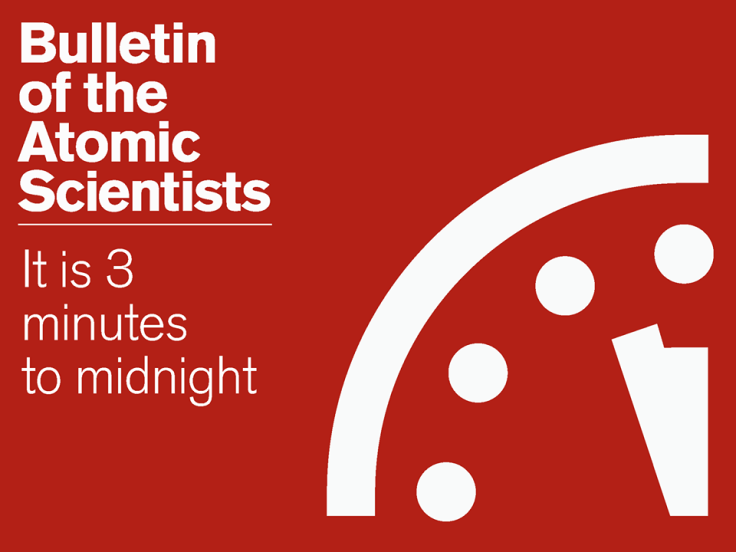Doomsday Clock Moved To 3 Minutes To Midnight, Closest To Apocalypse Since 1984

The Doomsday Clock has moved two minutes closer to midnight, the Bulletin of the Atomic Scientists announced in a press conference Thursday. The symbolic clock counting down to a global disaster had been at five minutes to midnight since 2012, when the Science and Security Board moved it from six over concerns about climate change and nuclear weapons. The latest change, to three minutes, is the closest the clock has been to midnight since the height of the Cold War in 1984.
The Bulletin of the Atomic Scientists changed the clock due to concerns over climate change, urging immediate action by government leaders and citizens regarding fossil fuels and heat-trapping gases such as carbon dioxide.
"We are addicted to fossil fuels," Richard Somerville, distinguished professor emeritus and research professor at the Scripps Institution of Oceanography, University of California at San Diego, said during the Doomsday Clock 2015 announcement. Somerville was coordinating lead author of the Fourth Assessment Report of the Intergovernmental Panel on Climate Change (IPCC). The IPCC and Al Gore were jointly awarded the Nobel Peace Prize in 2007.
The slowdown in nuclear disarmament was also of concern for the scientists. India, expanding its nuclear submarine fleet, Pakistan opening its third nuclear reactor and North Korea's continued activity was mentioned during the press conference.
"Founded in 1945 by University of Chicago scientists who had helped develop the first atomic weapons in the Manhattan Project, the Bulletin of the Atomic Scientists subsequently created the Doomsday Clock in 1947 using the imagery of apocalypse (midnight) and the contemporary idiom of nuclear explosion (countdown to zero) to convey threats to humanity and the planet," the Bulletin explained in a statement.
The Bulletin of the Atomic Scientists changed the clock in 2012 from six minutes to midnight to five minutes to midnight, due to the lack of progress in nuclear disarmament and climate change. The Bulletin also urged the scientific community to engage citizens to help tackle these issues. "Whether meeting the challenges of nuclear power, or mitigating the suffering from human-caused global warming, or preventing catastrophic nuclear conflict in a volatile world, the power of people is essential," the Bulletin said in the 2012 Doomsday Clock announcement.
The Doomsday Clock remained at five minutes to midnight in 2013 and 2014. In 2013, while there was some progress with nuclear disarmament, not enough was done in regards to climate change. For 2014, the clock remained unchanged following the inaction regarding nuclear disarmament and greenhouse gas.
"The clock ticks now at just three minutes to midnight because international leaders are failing to perform their most important duty -- ensuring and preserving the health and vitality of human civilization," the Bulletin of the Atomic Scientists said in a statement.
© Copyright IBTimes 2024. All rights reserved.






















